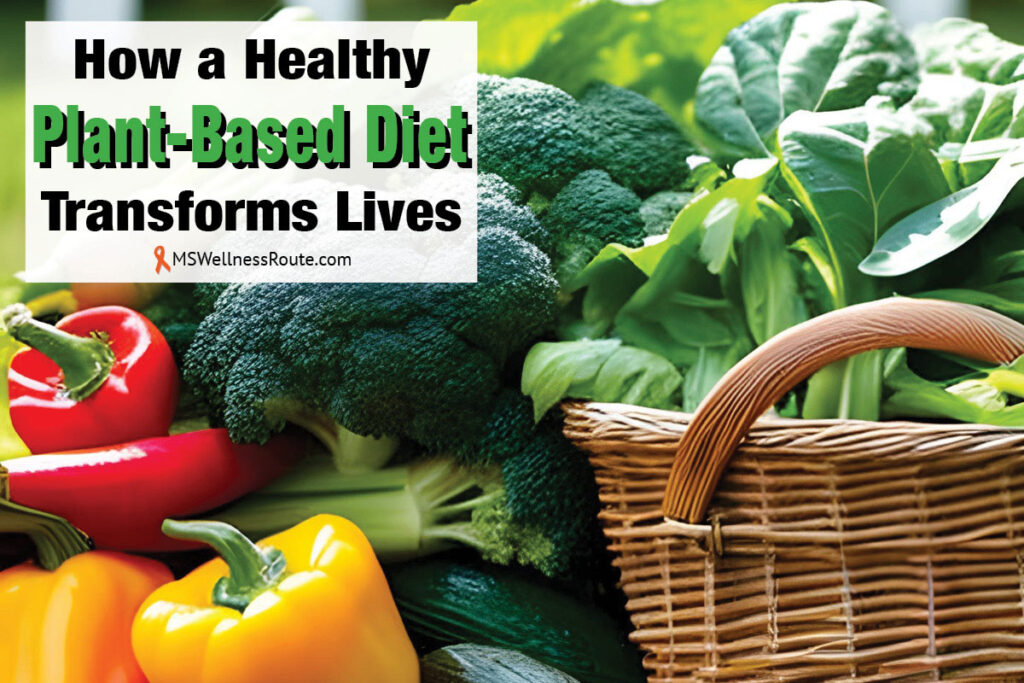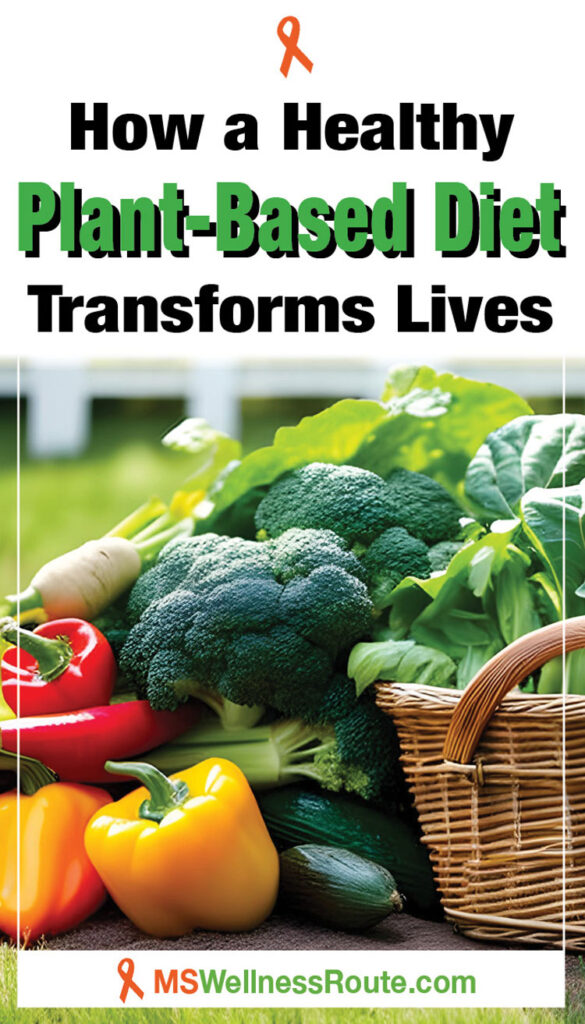Last Updated on November 13, 2023 by Cathy

A plant-based diet consists of foods that come from plants. That includes fruits, vegetables, legumes, whole grains, nuts, and seeds. However, if you eat a healthy plant-based diet for multiple sclerosis (MS) you need to avoid some of them.
The healthiest people around the world who live the longest eat mostly a plant-based diet. You don’t need to follow a strict plant-based diet. But, you do need to eat mostly leafy greens, vegetables, fruits, herbs, and spices. These are the foods that are going to heal your body.
Stop Eating Foods That Feed Diseases Including:
- Dairy
- Gluten
- Refined sugar
- Artificial flavors and sweeteners
- Natural flavors
- Corn (it’s mostly a GMO)
- Soy (it’s mostly a GMO)
- MSG
- Canola oil (it’s mostly a GMO)
- Pork (it’s high in fat and prone to parasites)
- Farmed fish (it’s washed in toxic chemicals due to parasites)
- Citric acid (processed citric acid is mostly derived from corn)
Some people avoid meat altogether such as vegans and vegetarians. However, you don’t need to cut out meat completely. To avoid antibiotics, growth hormones, and toxic chemicals eat healthier meats such as:
- Wild-caught fish
- Pastured-raised poultry
- Grass-fed meats
It’s best to avoid pork since it’s higher in fat and pigs are more prone to parasites. Instead of eating bacon made from pork, eat turkey bacon.
What To Eat On a Plant-Based Diet

Image by Freepik
The Mediterranean diet is one of the best-known examples of plant-based diet. It focuses mostly on plant foods along with the occasional animal proteins. I eat mostly a plant-based diet with very little meat. In the past year, I’ve only eaten meat twice.
It’s not because I’m trying to become a vegetarian. It’s because my last bloodwork showed I was heading toward heart disease. Eating a lot of meat, especially red meat, can increase the chance of heart disease. I was on a Paleo diet for over eight years and decided that it wasn’t working for me. I cut out meat because I’m eating a low-fat diet to protect my heart.
There are meat alternatives but you can’t trust what’s in it. For example, Beyond Meat has expeller-pressed canola oil and natural flavors. And, what exactly are natural flavors? If it really was a “natural flavor” wouldn’t food manufacturers list that instead?
From a health and safety standpoint, choose fresh or frozen whole foods instead.
A healthy plant-based diet for MS includes:
- Fruits and Vegetables. Include these in your daily meals for important vitamins, minerals, and antioxidants.
- Nuts and Seeds. These provide healthy fats, protein, and various nutrients. Examples include almonds, walnuts, flaxseeds, and chia seeds.
- Plant Oils. Use healthy fats like olive oil, avocado oil, and coconut oil for cooking and dressings.
- Dairy Alternatives. You can use plant-based milk, such as almond and coconut milk, instead of dairy milk.
Here are some foods you should avoid until your body has healed:
- Beans, lentils, and chickpeas are excellent sources of plant-based protein and fiber. They don’t necessarily cause problems but they are not healing foods either. If you want to eat these occasionally that’s okay but it’s best not to eat them all the time.
- Gluten-free grains are another group you should avoid until your body has healed. Like beans, lentils, and chickpeas they aren’t bad but they can cause a problem. Cross-contamination with gluten products is the biggest concern. Again, if you want to eat these do so only occasionally.
- Corn and soy used to be healthy. Today, you should avoid them since they are mostly GMOs.
- Eggs and peanuts are another concern. They are one of the top common food intolerances. Some MS diets allow eggs while others avoid them. It’s best to avoid them so your body can heal quicker.
You can use grain-free products such as almond flour, cassava flour, or coconut flour when preparing meals. But, it’s best to use them in moderation. Also, eat nuts, seeds, and healthy fats in moderation. To prevent heart disease and fatty liver disease – eat less fat.
People with MS have a higher risk for cardiovascular diseases. Women are more than twice as likely to die after a heart attack than men.
Benefits of Eating a Plant-Based Diet

Image by ArtPhoto_studio on Freepik
Switching to a plant-based diet can be good for your health, the environment, and animals too. Here are some of the key advantages:
- Gut Health. Research shows a connection between gut health and MS. Eating lots of plants with fiber helps keep your gut healthy. This has a positive impact on MS symptoms.
- Improved Fatigue Management. Some people with MS experience fatigue. A diet rich in whole plant foods helps provide energy throughout the day.
- Neuroprotection. Plants have compounds that protect the brain which could help people with MS.
- Reduced Inflammation. Many plant-based foods are rich in anti-inflammatory compounds like antioxidants. A diet that reduces inflammation can help slow down the progression of MS.
- Improved Heart Health. MS increases the risk of heart disease. Eating plant-based foods helps your heart by lowering cholesterol and preventing heart problems.
- Lower Risk of Chronic Diseases. Eating a plant-based diet decreases the risk of various chronic conditions. Including type 2 diabetes, hypertension, and certain cancers. The abundance of fiber and antioxidants in plant foods contributes to these benefits.
- Better Blood Sugar Control. Eating plant-based foods helps control blood sugar levels.
- Improved Kidney Health. A plant-based diet helps by reducing the workload of the kidneys. Thus by providing lower amounts of certain nutrients, such as protein and phosphorus.
- Lower Risk of Stroke. Studies show a plant-based diet helps lower the risk of stroke. This is due to its positive effects on blood pressure and cholesterol levels.
- Longevity. Studies show, people who eat plant-based diets live longer and have fewer diseases.
- Weight Management. Maintaining a healthy weight is important for people with MS. Excess weight can exacerbate symptoms. Plant-based diets tend to be lower in calorie density and help support a healthy weight.
- Reduced Environmental Impact. Plant-based diets have a lower carbon footprint. They require fewer natural resources and produce fewer greenhouse gas emissions.
- Ethical Considerations. Plant-based diets align with ethical concerns related to animal welfare. They avoid or minimize the use of animal products, which can involve animal suffering in farming practices.
Take Control of Your Health

Image by tirachard on Freepik
A well-planned healthy plant-based diet provides essential nutrients your body needs for optimal health. However, you do need to eat a wide variety of plant foods to ensure you get the right balance of nutrients.
Here are some key nutrients to be mindful of when following a healthy plant-based diet:
- Calcium. Plant sources include leafy greens, acorn squash, and almonds.
- Fiber. Plant-based diets are generally high in fiber, which is beneficial for digestive health.
- Iodine. A good source includes sea vegetables such as nori and kelp.
- Iron. Plant-based iron sources include spinach and pumpkin seeds. To improve the absorption of iron, eat foods with vitamin C (like oranges) with foods high in iron.
- Omega-3 Fatty Acids. Sources include flaxseeds, chia seeds, hemp seeds, walnuts, and algae-based. You can also take a plant-based omega-3 supplement with DHA and EPA.
- Protein. Plant-based sources of protein include nuts, seeds, spinach, broccoli, Brussels sprouts, and peas. It’s important to include a variety of these to ensure you get all the essential amino acids.
- Vitamin A. Foods like carrots, sweet potatoes, and leafy greens are good sources.
- Vitamin B12. This vitamin is important for people with MS. It’s primarily found in animal products, so it’s best to take a B12 supplement.
- Vitamin D. Vitamin D mainly comes from the sun, but vitamin D is also found in some plant foods. People with MS might need supplements.
- Zinc. Sources include sprouts, radishes, parsley, nuts, seeds, and raw honey.
Don’t forget to exercise, get plenty of sleep, reduce your stress, and keep a positive mindset.
Plant-Based Diet

Image by valeria_aksakova on Freepik
Your body thrives when you eat more leafy greens, vegetables, fruits, herbs, and spices. Plus, eating less meat will save you money. In both books, The Blue Zone and The China Study they found a plant-based diet is best for a long healthy life.
You don’t necessarily need to cut meat out of your diet but you do need to eat more fruits and vegetables. To eat more plant-based foods, include fruits, vegetables, nuts, and seeds in your diet. It helps keep you healthy, makes you strong, and lets you live a long, happy life. Plus, it’s friendly to animals and our planet Earth!
When you eat lots of these plant-based foods, you’re helping your body heal. You’re also helping nature and animals. – It’s a win-win!

Ultimate Guide to Surviving & Thriving with MS
Unlock the power of a healthy lifestyle with this exclusive ebook! Discover practical strategies and expert advice on managing MS naturally through nutritious eating and mindful living. This comprehensive guide is packed with wellness tips, and lifestyle recommendations tailored specifically for you. Take control of your health and embark on a transformative journey toward a balanced and vibrant life. Get your hands on this invaluable resource and start thriving today!
Want to remember this health tip? Pin it to your Pinterest board!

Image by Canva





